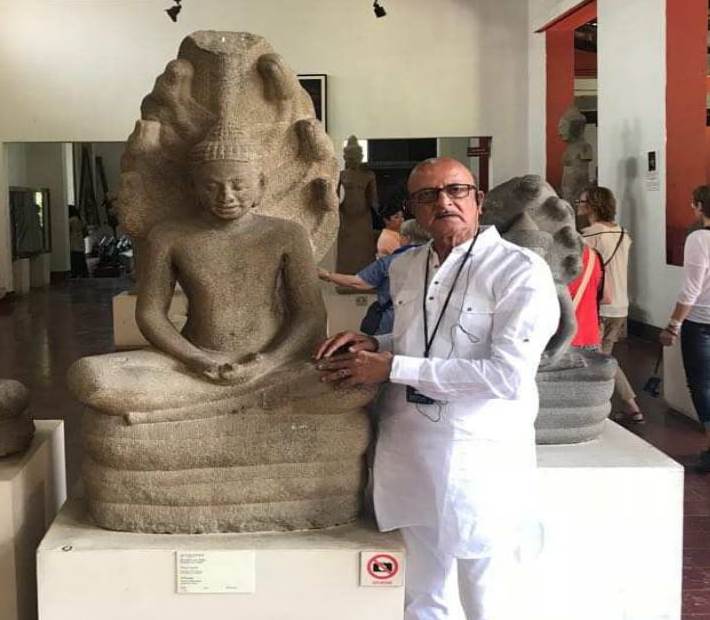
INTERNATIONAL SCHOOL FOR JAIN STUDIES
NEWSLETTER
Vol.1, Issue 1, May 2018
63 Students to attend ISJS Summer School this year
Students of 2017 Summer School with Union Minister Smt. Maneka Gandhi
This year, some 63 students have enrolled for the four Summer Programmes offered by the International School for Jain Studies (ISJS) starting June 22. The ISJS Summer program is intended to provide students the opportunity to pursue Jain studies in India. The course includes daily lectures, travel to places of historical significance, interaction with Jain communities and participation in cultural activities.
Survey Reports of Hauz Khas Tehsil and New Delhi District Released

Presentation of survey reports of Hauz Khas Tehsil and New Delhi District
The International School for Jain Studies recently released its survey reports on Jain communities of Delhi. These surveys were carried out in Hauz Khas Tehsil and New Delhi District. The surveys were part of a larger study on Jain population in India. The data for the two surveys were collected between August 2017 and January 2018.
Online Journal "ISJS-Transactions"

The International School for Jain Studies is inviting research papers, articles and book reviews for its forthcoming on-line peer-reviewed bi-lingual (English & Hindi), quarterly, refereed research "ISJS-Transactions" (ISSN: 2457-0583). The objective of the Journals is to provide an intellectual platform to the international scholars who are working in the areas of Jain studies in particular and Indic studies in general. It also aims to increase awareness about Jain studies, including their application and relevance to today’s ever changing world and way of life.
Recent Publication(s)
- Jainism for young Inquisitive by Dr. Shugan C Jain, published by International School for Jain Studies, 2018, pages X+90, ISBN No: 778-81-9336-20-3-7, Price- Rs. 150 & US$ 5. This book intends to provide brief but comprehensive knowledge/wisdom about Jainism to young inquisitive high school and college students primarily who are unfamiliar with Jainism and arouse interest in them to know more about it. The book starts with the Jain symbol of the raised hand, a sign that means to stop for a minute and think twice about Ahimsa before doing anything.
Seminars/Lectures
- Dr. Shugan C Jain, delivered a lecture on “Fear and Fearlessness: Violence and Non- Violence” on 13th May 2018 at Sushil Muni Ashram, Defence Colony, New Delhi. This lecture was part of our series of monthly lectures on Jainlogy. This series has been running for the past 3 years.
Research projects
- Delhi Jain population surveys for Hauz Khas tehsil and New Delhi district completed in January, 2018.
- Sociological profiles of Jain communities in India:
- Belgaum Survey completed; report writing in progress.
- Similar surveys at Jabalpur, Indore, Bhopal, Sagar, Kolhapur, Solapur, Ahmednagar, Pune and Ahmedabad are in progress.
Events
- Felicitation(s): Dr. Shugan Chand Jain, Chairman, International School for Jain Studies (ISJS), New Delhi was honoured by Shri Nirmal Jain Sethi, President, Shri Bharat Varshiya Digambar Jain Dharm Sanrakshan Mahasabha in a function here in Delhi on 15th May 2018 for his contribution to promote Jain studies in India and abroad.
- Conference on Jainism and the Environment: On April 14, the Bhagwan Adinath Professorship in Jain Studies at the University of North Texas held a one day conference on the topic of “Jainism and the Environment” featuring a keynote address by the eminent scholar of Jain Studies Christopher Key Chapple.
- Prakrit Summer School 2018 at BLII in progress: The 3 week summer school started on 13th May 2018 at Bhogilal Leherchand Institute of Indology, Vijay Vallabh Smarak Complex, Alipur, Delhi and was inaugurated by Prof. S. S. Rana.
- A 21-day national workshop on Prakrit Language and Literature at Parshwanath Vidyapeeth, Varanasi: The inaugural session of the workshop started on 18th May 2018 was presided by Prof. K. D. Tripathi, Hon’ble Chancellor of Mahatama Gandhi International Hindi university, Wardha. Prof. H. S. Pandey, Sanskrit University, Varanasi was the chief-guest and Prof. D. N. Sharma, Gujarat University, Ahmedabad was the guest of honour.
- A lecture on Deogarh Sculptures: A lecture on Jain Sculptures of the Deogarh Temple Complex was delivered by Prof. Neeru Mishra, Visiting professor at Manipur Cultural University, Imphal on 18th May 2018 at India International Center, New Delhi. The lecture was organized by Bhogilal Leherchand Institute of Indology & India International Center.
- Dr. Kalyan Gangwal & Mrs. Gangwal recently visited Vietnam & Cambodia in search of roots of Jainism. They came across a number of ancient pratimas of Lord Parashwanath.
Editor: Dr. Shrinetra Pandey
E-mail: issjs_india@yahoo.co.in; www.isjs.in
Disclaimer: You are receiving this Newsletter because of your association with ISJS. In case you want to unsubscribe Click Here

